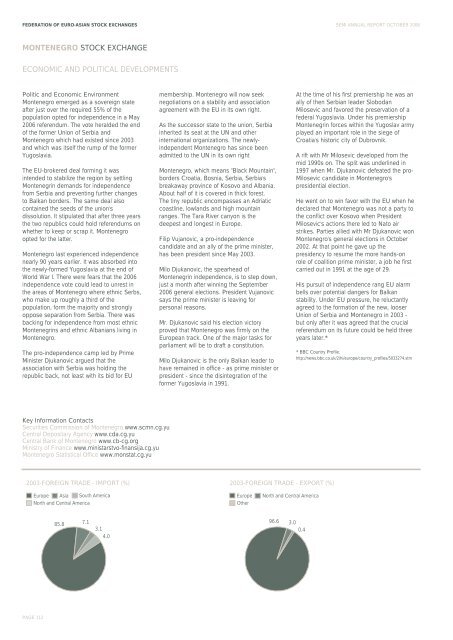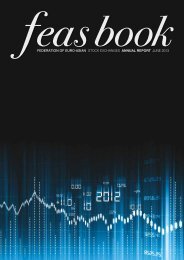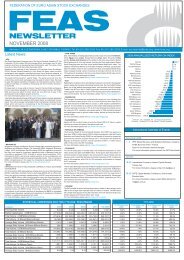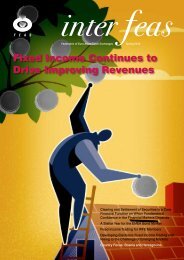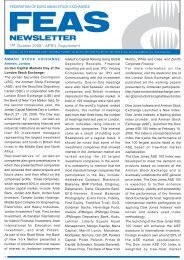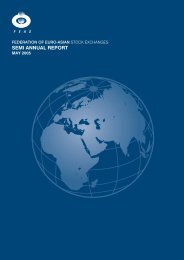Download - FEAS
Download - FEAS
Download - FEAS
You also want an ePaper? Increase the reach of your titles
YUMPU automatically turns print PDFs into web optimized ePapers that Google loves.
FEDERATION OF EURO-ASIAN STOCK EXCHANGES SEMI ANNUAL REPORT OCTOBER 2006<br />
MONTENEGRO STOCK EXCHANGE<br />
ECONOMIC AND POLITICAL DEVELOPMENTS<br />
Politic and Economic Environment<br />
Montenegro emerged as a sovereign state<br />
after just over the required 55% of the<br />
population opted for independence in a May<br />
2006 referendum. The vote heralded the end<br />
of the former Union of Serbia and<br />
Montenegro which had existed since 2003<br />
and which was itself the rump of the former<br />
Yugoslavia.<br />
The EU-brokered deal forming it was<br />
intended to stabilize the region by settling<br />
Montenegrin demands for independence<br />
from Serbia and preventing further changes<br />
to Balkan borders. The same deal also<br />
contained the seeds of the union's<br />
dissolution. It stipulated that after three years<br />
the two republics could hold referendums on<br />
whether to keep or scrap it. Montenegro<br />
opted for the latter.<br />
Montenegro last experienced independence<br />
nearly 90 years earlier. It was absorbed into<br />
the newly-formed Yugoslavia at the end of<br />
World War I. There were fears that the 2006<br />
independence vote could lead to unrest in<br />
the areas of Montenegro where ethnic Serbs,<br />
who make up roughly a third of the<br />
population, form the majority and strongly<br />
oppose separation from Serbia. There was<br />
backing for independence from most ethnic<br />
Montenegrins and ethnic Albanians living in<br />
Montenegro.<br />
The pro-independence camp led by Prime<br />
Minister Djukanovic argued that the<br />
association with Serbia was holding the<br />
republic back, not least with its bid for EU<br />
membership. Montenegro will now seek<br />
negotiations on a stability and association<br />
agreement with the EU in its own right.<br />
As the successor state to the union, Serbia<br />
inherited its seat at the UN and other<br />
international organizations. The newlyindependent<br />
Montenegro has since been<br />
admitted to the UN in its own right<br />
Montenegro, which means "Black Mountain",<br />
borders Croatia, Bosnia, Serbia, Serbia's<br />
breakaway province of Kosovo and Albania.<br />
About half of it is covered in thick forest.<br />
The tiny republic encompasses an Adriatic<br />
coastline, lowlands and high mountain<br />
ranges. The Tara River canyon is the<br />
deepest and longest in Europe.<br />
Filip Vujanovic, a pro-independence<br />
candidate and an ally of the prime minister,<br />
has been president since May 2003.<br />
Milo Djukanovic, the spearhead of<br />
Montenegrin independence, is to step down,<br />
just a month after winning the September<br />
2006 general elections. President Vujanovic<br />
says the prime minister is leaving for<br />
personal reasons.<br />
Mr. Djukanovic said his election victory<br />
proved that Montenegro was firmly on the<br />
European track. One of the major tasks for<br />
parliament will be to draft a constitution.<br />
Milo Djukanovic is the only Balkan leader to<br />
have remained in office - as prime minister or<br />
president - since the disintegration of the<br />
former Yugoslavia in 1991.<br />
At the time of his first premiership he was an<br />
ally of then Serbian leader Slobodan<br />
Milosevic and favored the preservation of a<br />
federal Yugoslavia. Under his premiership<br />
Montenegrin forces within the Yugoslav army<br />
played an important role in the siege of<br />
Croatia's historic city of Dubrovnik.<br />
A rift with Mr Milosevic developed from the<br />
mid 1990s on. The split was underlined in<br />
1997 when Mr. Djukanovic defeated the pro-<br />
Milosevic candidate in Montenegro's<br />
presidential election.<br />
He went on to win favor with the EU when he<br />
declared that Montenegro was not a party to<br />
the conflict over Kosovo when President<br />
Milosevic's actions there led to Nato air<br />
strikes. Parties allied with Mr Djukanovic won<br />
Montenegro's general elections in October<br />
2002. At that point he gave up the<br />
presidency to resume the more hands-on<br />
role of coalition prime minister, a job he first<br />
carried out in 1991 at the age of 29.<br />
His pursuit of independence rang EU alarm<br />
bells over potential dangers for Balkan<br />
stability. Under EU pressure, he reluctantly<br />
agreed to the formation of the new, looser<br />
Union of Serbia and Montenegro in 2003 -<br />
but only after it was agreed that the crucial<br />
referendum on its future could be held three<br />
years later.*<br />
* BBC Country Profile.<br />
http://news.bbc.co.uk/2/hi/europe/country_profiles/5033274.stm<br />
Key Information Contacts<br />
Securities Commission of Montenegro www.scmn.cg.yu<br />
Central Depositary Agency www.cda.cg.yu<br />
Central Bank of Montenegro www.cb-cg.org<br />
Ministry of Finance www.ministarstvo-finansija.cg.yu<br />
Montenegro Statistical Office www.monstat.cg.yu<br />
2003-FOREIGN TRADE - IMPORT (%) 2003-FOREIGN TRADE - EXPORT (%)<br />
Europe Asia South America<br />
North and Central America<br />
Europe<br />
Other<br />
North and Central America<br />
85.8 7.1<br />
3.1<br />
4.0<br />
96.6 3.0<br />
0.4<br />
PAGE 112


